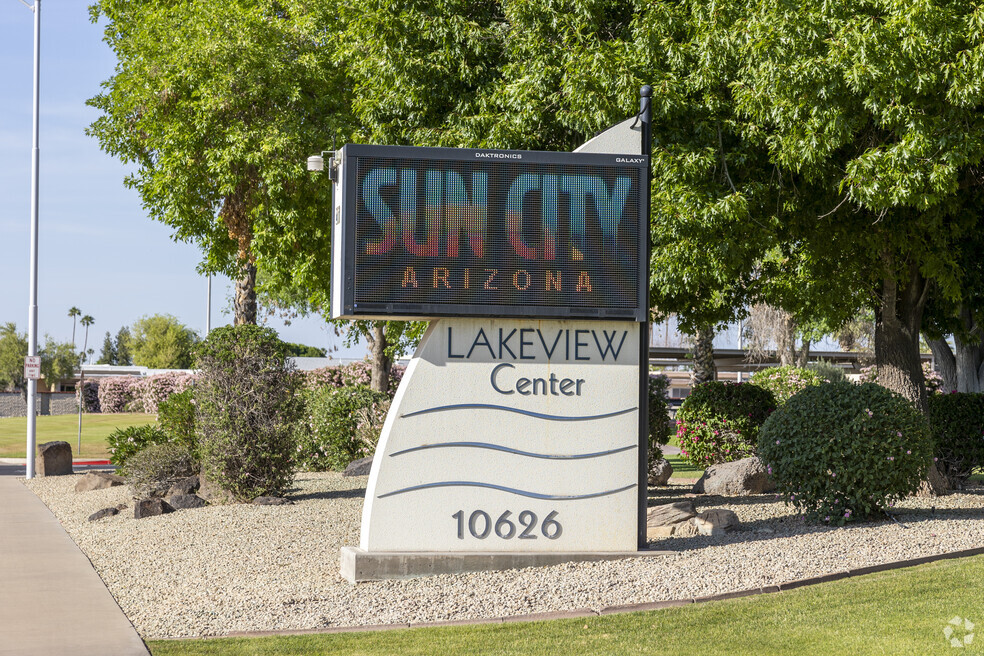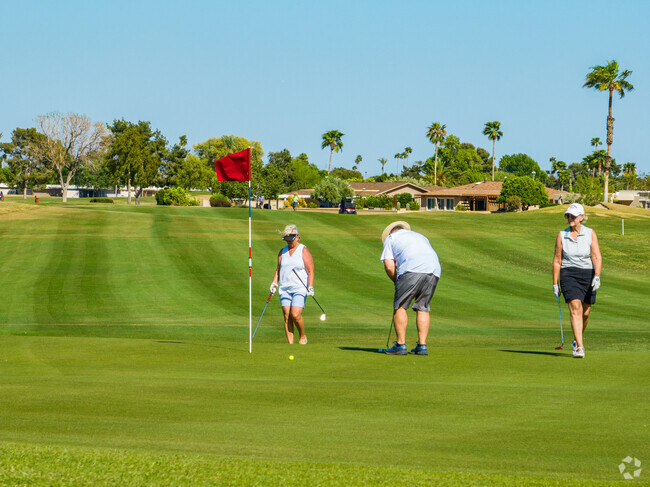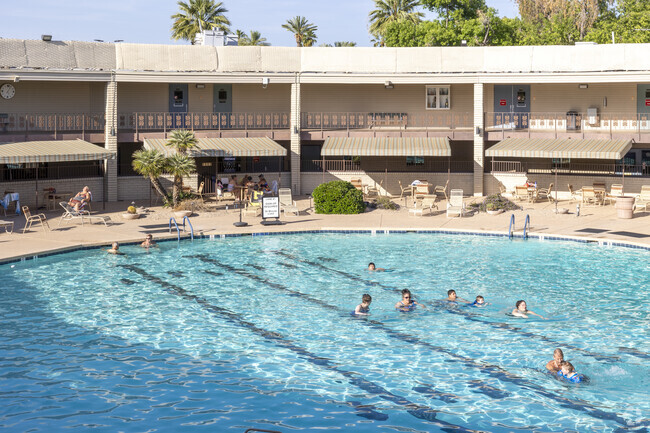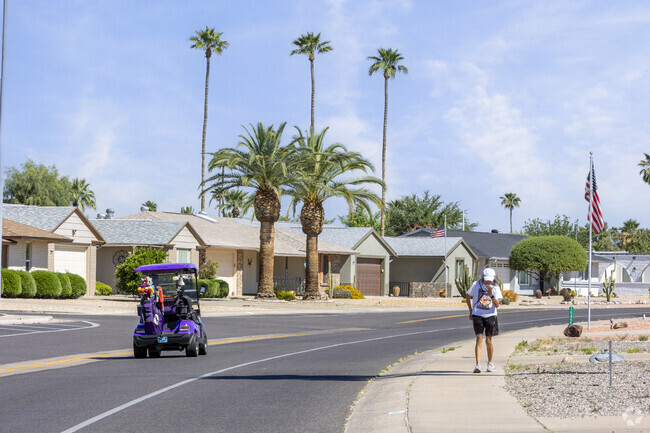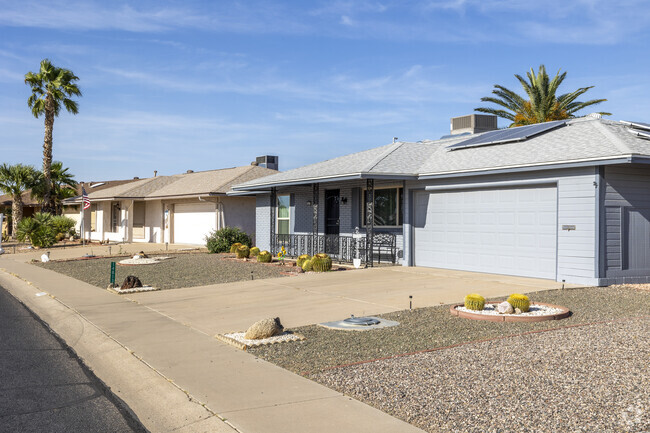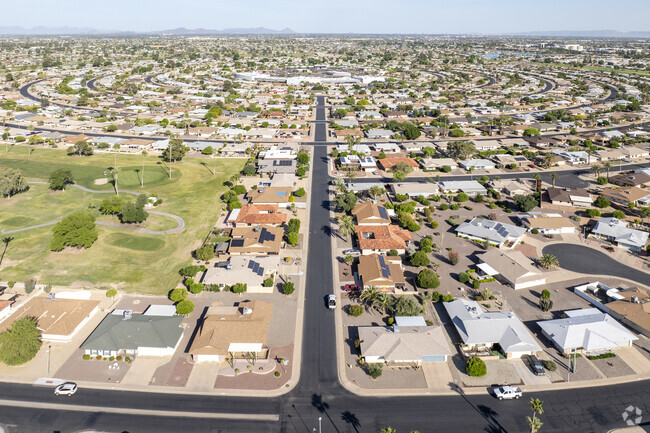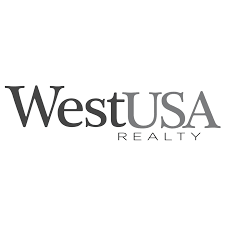Master-planned city for retirees
Set 16 miles northwest of Phoenix, master-planned Sun City was developed in 1960 by Del E. Webb, prior to its sister communities of Sun City West and Sun City Grand. Sun City has since grown into one of the largest, most popular retirement communities in America, with about 37,000 residents aged 55 and older, and over 27,000 homes. Residents here have easy access to shopping, healthcare and houses of worship, and amenities like golf courses, recreation centers and social clubs support an active, engaged retirement lifestyle.
Wide price range for 55+ homes
Set along sidewalk-lined streets laid out in concentric circles, Sun City's housing is mostly a mix of one- to three-bedroom homes built between the 1960s and today. The 20th-century homes are typically ranch-style, while homes built in the early 2000s or later have Spanish-style details like terracotta-tiled roofs and tan stucco exteriors. “About 95% of the houses here are single-story with generous lot sizes,” says Shirley Owens, a Realtor with HomeSmart, who has more than 24 years of experience. Lots typically range from around 2,000 to 15,000 square feet, and yards are usually landscaped with manicured lawns or rock gardens. “The typical floor plan is two bedrooms, or two bedrooms plus a den. The other popular style is the twin home, which is two units joined by a garage in the middle.”
Sun City homebuyers can find homes that are either above or below the national average price of about $400,000. Most homes here range from $150,000 to $500,000, depending on size and features like private pools, but custom lakefront houses on the private Dawn Lake range from $600,000 to $800,000. All local homes are a part of the Sun City homeowners association, whose monthly dues range from $25 to $300, and grant access to shared spaces. Homes typically sell after 51 days on the market here, slightly longer than the national average of 44 days.
A city designed around leisure
There are eight recreation centers in Sun City, each loaded with different indoor and outdoor amenities, like gyms, bowling lanes or shuffleboard courts—to just name a few. Marinette Center offers an outdoor walking track and 20 pickleball courts, while Bell Center is the spot for a round of racquetball or bar games like billiards and darts. Also, at the Bell Center, residents can check out books at the Sun City Library or head to the social halls for club meetings. Folks looking to take a dip in the pool have several to choose from, and each has its own purpose, like laps, salt water or therapeutic exercise. There are eight golf courses in Sun City, each offering 18- or 9-hole rounds with varying levels of difficulty. Dogs can play off-leash at Duffeeland Dog Park, and at the 33-acre Viewpoint Lake, residents may take their small boats out or cast their fishing lines for largemouth bass.
Shopping and dining along 99th Avenue
Shopping and dining are found along 99th Avenue. “There are all kinds of restaurants, many of them are old-fashioned, mom-and-pop-style,” says Owens. There are cafes to stop into for a morning coffee, sports bars to watch the game and restaurants with a global array of cuisines, including Thai, Italian and Greek. Strip malls and shopping plazas feature a mix of fast-food chains and national retailers, as well as small local businesses like jewelry stores and pet-grooming services.
Art and clubs abound
Sun City has over 100 special interest clubs for residents to join. Many focus on creative pursuits like ceramics, woodworking, stained glass and cross-stitching; Lapidary Club is a unique highlight, where members shape and polish stones that might be sold in the club store. “There’s more to do than people have time for," Owens says. "You have acting clubs, book clubs, even hiking and motorcycle clubs." The Sundial Auditorium and Sun Bowl Amphitheater regularly host free performances, like concerts and theatrical productions; other free events throughout the year include bingo, trivia and game nights.
Getting around from Sun City
Sun City residents have easy access to Routes 60 and 101, both of which travel the Phoenix Metropolitan Area; downtown Phoenix is 16 miles northwest, a 20- to 40-minute drive during rush hour. Within the city, says Owens, "Golf carts are street legal —you can drive them pretty much anywhere." Residential streets are generally lined with sidewalks and bike lanes. Public transportation is limited, but there are a few Valley Metro bus routes that run through Sun City, and the Sun Cities Area Transit System offers a dial-a-ride service. Banner Boswell Medical Center is centrally located within Sun City. Glendale Municipal Airport is 6 miles south, while Phoenix Sky Harbor International Airport is about 26 miles southeast.
Crime and environmental concerns
The Maricopa County Sheriff's Office responds to Sun City emergencies, and the FBI’s Crime Data Explorer says the total number of violent- and property-related crimes reported by MCSO has decreased from about 6,100 crimes in 2014 to about 1,500 in 2022. However, MCSO has acknowledged that this trend may be related to a drop in data reporting, which they attribute to staffing shortages and software limitations. To discourage crime in the area, residents have formed Sun City Posse, a neighborhood watch organization that patrols the community and checks in on homes while residents are on vacation.
Due to Sun City’s desert climate, extreme heat and wildfires are the main environmental concerns for homeowners. While fire insurance isn’t required in Arizona, homebuyers may want to look into insurance and emergency preparedness options. There haven’t been any recent wildfires reported in the Sun City area. With an average of 300 sunny days each year and summer temperatures regularly topping 100 degrees, Sun City earns its name, and residents here can cool off in either private or shared swimming pools.
New expansion
Sun City is constantly updating its facilities, adding staff and creating new social opportunities for residents. According to the Sun City Independent, as of Fall 2024, residents are discussing development ideas to improve the city’s golf courses.

Photography Contributed By
Ryan Nelson

